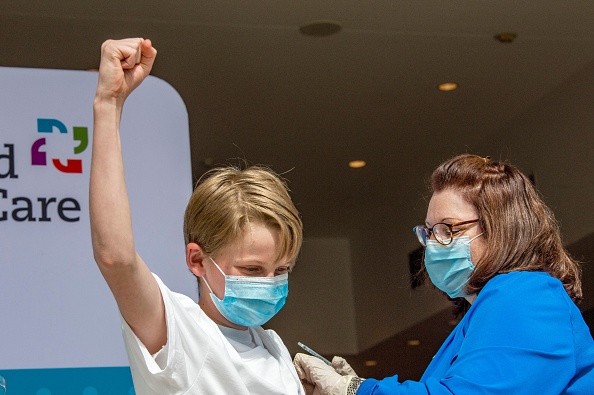The Pfizer COVID-19 vaccine has been recommended by the advisory panel of the Food and Drug Administration for children ages 5 to 11 years old.
The vaccine dose that will be given to children will be significantly less than the dosage adults receive.
The FDA has yet to issue a formal and official authorization. The agency may or may not do so in the coming days as it is not required to follow the recommendations of its advisory panel.
The Pfizer COVID-19 vaccine is an example of an mRNA vaccine. Another mRNA vaccine available to the public is the Moderna vaccine.
Pfizer COVID-19 Vaccine Recommended for Kids

The Pfizer COVID-19 vaccine has received the recommendation of the FDA's advisory panel for children ages 5 to 11 years old. According to a report by NPR, 17 members of the panel voted in favor while one member abstained.
The NPR report adds that "the FDA panel accepted Pfizer's data indicating the vaccine is safe and 90.7% effective in preventing COVID-19 infections in this age group."
The FDA has yet to issue official authorization on the use of Pfizer COVID-19 vaccines for children 5 to 11 years old. It may do so in the coming days.
Once the FDA issues its formal authorization, the Centers for Disease Control and Prevention (CDC) may release guidelines by next week.
According to the NPR report, "A dose of Pfizer for young children contains one-third the amount of active ingredient compared to the adult dose." Kids who receive their first dose must wait for at least 21 days before receiving their second dose.
Early this month, Pfizer filed for emergency use authorization for the age group.
Related Article: COVID-19 Vaccine Trials: US Kids Reportedly Sign Up for Pfizer, Moderna, and AstraZeneca Tests
The Pfizer COVID-19 Vaccine
According to the CDC, the Pfizer-BioNTech COVID-19 vaccine is an example of an mRNA vaccine. The Pfizer vaccine is administered in two doses that are at least 21 days apart. The shot is done in the muscle of the upper arm.
The COVID-19 vaccine received full FDA approval on August 23, 2021, and has been recommended for people ages 12 years old and older.
The Pfizer vaccine is also now being used as booster shots as well. Per the CDC, immunocompromised individuals should wait for at least 28 days before they get their third dose of the vaccine.
Others who do not belong in this classification will have to wait for six months to get their booster shot.
mRNA Vaccines
mRNA vaccines "teach our cells how to make a protein that will trigger an immune response inside our bodies," according to a separate post on the CDC website.
Aside from the Pfizer-BioNTech vaccine, another example of an mRNA COVID-19 vaccine is the Moderna vaccine.
The CDC has made it clear in its website post that the mRNA vaccines do not give anyone the virus that causes COVID-19. These vaccines also do not affect or alter human DNA.
Read Also: COVID-19: New Study Says Third Booster Shot of mRNA Could Create Better Results
This article is owned by Tech Times
Written by Isabella James
ⓒ 2025 TECHTIMES.com All rights reserved. Do not reproduce without permission.




